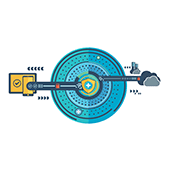 Virtual private networks (VPNs) keep your online activities secure and private, which is especially useful if you're using a public Wi-Fi network. But considering the variety of VPNs in the market today, it’s hard to find which one is the best for your business. Here are tips to help you make the right choice.
Virtual private networks (VPNs) keep your online activities secure and private, which is especially useful if you're using a public Wi-Fi network. But considering the variety of VPNs in the market today, it’s hard to find which one is the best for your business. Here are tips to help you make the right choice.
What is a VPN?
A VPN creates a secure tunnel between your device and the websites you visit, protecting you from hackers looking to intercept your data. All data transmitted and received through this secure connection is encrypted, preventing any third party from monitoring your online activities.
VPNs can also disguise your location. Once you’ve established a connection to a VPN server, your computer acts as if it’s using the same local connection as the VPN. As far as websites are concerned, you are browsing from the server’s geographical area and not your actual location.
Why should you have a VPN?
VPNs augment your cybersecurity and help protect your privacy. For instance, it’s generally considered bad practice to connect to public Wi-Fi networks, like those in cafes, libraries, and airports. This is because all data transmitted through these networks are unencrypted and, thus, are susceptible to exposure and theft. If you must use public Wi-Fi, make sure to activate your VPN. The VPN encrypts your data and keeps your connection secure as you surf the internet.
VPNs’ ability to mask your location also makes them ideal for accessing geo-restricted websites and content. If you’re traveling abroad and you find that critical documents or US websites are geo-blocked in your current location, just connect to a VPN server in the United States to regain access.
How do you choose a VPN?
Given the increasing demand for greater online privacy, VPNs are surging in popularity. When selecting which VPN to purchase, take the following into account:
Cost
There are free VPNs out there, but they likely keep logs of your internet activity or are filled with disruptive ads. That's why it's best to invest in paid VPNs like NordVPN and ExpressVPN. These paid options come with robust features, such as a large list of available servers, and configurations that bolster your data’s security.
Location
Where your VPN’s servers are located matters for several reasons. For one, the farther away the server you’re connected to is, the greater the likelihood that you’ll suffer latency issues. For a smooth surfing experience, it’s best to connect to the closest available server. Additionally, if you want to avoid geo-restrictions, you’d want to connect to servers in the same location as the content you’re looking to access. This means if you want to access research published in the United Kingdom, make sure your VPN has servers located in that country.
Capacity
Inquire with the provider or read their terms of service to determine how much data you’re allowed to use. If your tasks require a lot of online resources, then you should choose a VPN with a high data allocation. Also, find out how many of the VPN servers are online; a greater number of online servers means the VPN is capable of supporting resource-intensive tasks
Device compatibility
Choose a VPN that can be used across multiple devices. If you use your laptop, tablet, or smartphone to do your tasks, then you should invest in a VPN that’s compatible with all of these.
IP leak
Some VPN tunnels are not as secure as others. In some cases, the VPN could leak your IP address, enabling third parties to track your data and activities. Before buying a VPN, sign up for a free trial of the service if available. Activate the VPN and visit IP Leak. If the website says your IP address is being leaked, choose a different VPN.
If you need help in selecting the right VPN for your business, consult with our security experts today. We also offer comprehensive cybersecurity services so no hacker or third party can get their hands on your data.

You must be logged in to post a comment.